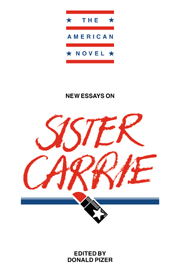Book contents
- Frontmatter
- Contents
- Series Editor's Preface
- Note on the Text
- 1 Introduction
- 2 Carrie's Blues
- 3 A Portrait of the Artist as a Young Actress: The Rewards of Representation in Sister Carrie
- 4 Sister Carrie: The City, the Self, and the Modes of Narrative Discourse
- 5 Who Narrates? Dreiser's Presence in Sister Carrie
- Notes on Contributors
- Selected Bibliography
5 - Who Narrates? Dreiser's Presence in Sister Carrie
Published online by Cambridge University Press: 05 June 2012
- Frontmatter
- Contents
- Series Editor's Preface
- Note on the Text
- 1 Introduction
- 2 Carrie's Blues
- 3 A Portrait of the Artist as a Young Actress: The Rewards of Representation in Sister Carrie
- 4 Sister Carrie: The City, the Self, and the Modes of Narrative Discourse
- 5 Who Narrates? Dreiser's Presence in Sister Carrie
- Notes on Contributors
- Selected Bibliography
Summary
He is no philosopher.
His only gift is to enact
All that his deepest self abhors,
And learn, in his self-contempting distress,
The secret worth
Of all our human worthlessness.
-Robert Penn WarrenWHY has Sister Carrie so resolutely defied interpretation? Born into controversy when its original publisher tried to cancel its contract in 1900 – the whole episode exaggerated by Dreiser into a notorious scandal of suppression – the novel has yet to free itself altogether from the fate of exemplifying a life or a cultural moment. Few scholars dispute its importance – but as an event in the history of American mores and morals more than as a novel interesting for being just that: a work of fiction. Signs of change have appeared recently, including disagreements over what the novel may mean. Is the book for or against capitalism? Is it as sentimental as it often sounds? And the “bad” writing every critic, even the friendliest, has deplored – is it perhaps intentionally bad, Dreiser's effort at parody of the language of “false consciousness” to highlight a style of “realism” as antidote to the romantic pap, the “linguistic junk of commodified language” bred by consumer capitalism? What are the generic relations between “romance” and “realism” in the book? Recent readers have been prone to see the book as a battleground of styles, of genres, of ideologies, and to ask what Sister Carrie might mean for us today as a text of its own times.
- Type
- Chapter
- Information
- New Essays on Sister Carrie , pp. 87 - 122Publisher: Cambridge University PressPrint publication year: 1991
- 2
- Cited by



